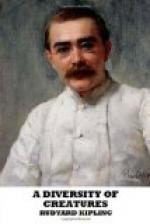‘What?’ growled Penfentenyou.
‘Nothing,’ said the Agent-General, squeezing my hand affectionately. ‘Only we have just found out that we are brothers.’
‘Exactly,’ said Mr. Lingnam. ’That’s what I’ve been trying to lead up to. We’re all brothers. D’you realise that fifteen years ago such a conversation as we’re having would have been unthinkable? The Empire wouldn’t have been ripe for it. To go back, even ten years—’
‘I’ve got it,’ cried the Agent-General. ’"Brighton, Cincinnati, and Nijni-Novgorod!” God bless R.L.S.! Go on, Uncle Joseph. I can endure much now.’
Mr. Lingnam went on like our shandrydan, slowly and loudly. He admitted that a man obsessed with a Central Idea—and, after all, the only thing that mattered was the Idea—might become a bore, but the World’s Work, he pointed out, had been done by bores. So he laid his bones down to that work till we abandoned ourselves to the passage of time and the Mercy of Allah, Who Alone closes the Mouths of His Prophets. And we wasted more than fifty miles of summer’s vivid own England upon him the while.
About two o’clock we topped Sumtner Rising and looked down on the village of Sumtner Barton, which lies just across a single railway line, spanned by a red brick bridge. The thick, thunderous June airs brought us gusts of melody from a giddy-go-round steam-organ in full blast near the pond on the village green. Drums, too, thumped and banners waved and regalia flashed at the far end of the broad village street. Mr. Lingnam asked why.
‘Nothing Imperial, I’m afraid. It looks like a Foresters’ Fete—one of our big Mutual Benefit Societies,’ I explained.
‘The Idea only needs to be co-ordinated to Imperial scale—’ he began.
‘But it means that the pub. will be crowded,’ I went on.
‘What’s the matter with lunching by the roadside here?’ said Penfentenyou. ‘We’ve got the lunch-basket.’
‘Haven’t you ever heard of Sumtner Barton ales?’ I demanded, and be became the administrator at once, saying, ’I see! Lingnam can drive us in and we’ll get some, while Holford’—this was the hireling chauffeur, whose views on beer we knew not—’lays out lunch here. That’ll be better than eating at the pub. We can take in the Foresters’ Fete as well, and perhaps I can buy some newspapers at the station.’
‘True,’ I answered. ’The railway station is just under that bridge, and we’ll come back and lunch here.’
I indicated a terrace of cool clean shade beneath kindly beeches at the head of Sumtner Rise. As Holford got out the lunch-basket, a detachment of Regular troops on manoeuvres swung down the baking road.
‘Ah!’ said Mr. Lingnam, the monthly-magazine roll in his voice. ’All Europe is an armed camp, groaning, as I remember I once wrote, under the weight of its accoutrements.’
‘Oh, hop in and drive,’ cried Penfentenyou. ‘We want that beer!’




